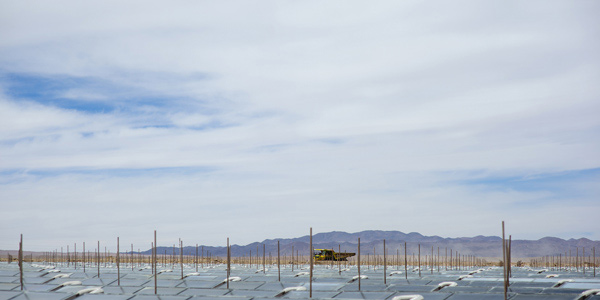A checklist for commercial solar PV
Answer these 10 questions before signing off on your commercial or industrial solar photovoltaic (PV) project – and see how PowerPulse by Standard Bank can assist in simplifying and de-risking the process:
1. Have you conducted an accurate needs analysis of your commercial solar power requirements?
It’s essential to assess your site, capacity and future expansion requirements – and for commercial and industrial solar installations this is no simple exercise. PowerPulse guides you through this process to determine the feasibility of a solar power project based on your specific needs and ensures proposals meet capacity requirements to deliver on ROI expectations.
2. Have you completed a Solar PV feasibility study for your site?
Do you have the space required to accommodate the number of solar panels needed to power your business? Can the panels be optimally positioned for maximum exposure? Can your roof accommodate panels? The PowerPulse Concierge Team will coordinate briefing sessions and site visits with pre-vetted Engineering, Procurement, and Construction (EPC) suppliers to conduct a thorough investigation of your premises and needs before proposals are generated.
3. Have you developed a solid business, operational and financial case for solar?
- Cost security: If you simply wish to reduce your electricity costs you may consider a grid-tied solar system without batteries. This is an attractive option to companies where energy tariffs represent a high percentage of their operating costs.
- Supply security: If you are also wanting to mitigate against outages, then adding battery storage to create an off-grid hybrid system is essential to reduce peak energy consumption and the impact of interrupted energy supply.
- Energy independence: Unless an entity experiences exorbitant downtime costs, complete off-grid systems that offer total energy independence are typically not economically viable due to the battery storage requirement needed to meet commercial and industrial capacity needs, versus the current utility charges.
PowerPulse assists you in determining your capacity needs and building a business case for solar, factoring in operational requirements (present and future), and financial calculations to determine pay-back period until cash neutrality is achieved.
4. Have you vetted the supplier/s you will work with?
It’s estimated there are over 10 000 vendors operating in the solar energy market in South Africa today. With low barriers to entry, many unaccredited operators, and some vendors willing to cut corners and use cheap components to reduce project costs, it’s essential to do a thorough due diligence on the supplier/s you work with.
PowerPulse connects you to credible, accredited EPC suppliers that have been pre-vetted for the requisite skills, track record and accreditations.
5. Are you able to compare like-for-like on the estimates you receive?
While price is always important, it’s also vital to compare output capacity, lifespan and quality of components, warranties, ongoing maintenance requirements, system scalability and ROI calculations.
PowerPulse equips you with a comparison report that provides this level of transparency, thus enabling you to make informed and educated decisions.
6. Have you verified that the components quoted on, are produced by OEMs and are covered by warrantees?
Solar power systems tend to have a lifetime of approximately 25 years – and while some panels carry warranties of up to 20 years or more, other system components may have different or lesser warranties. It’s therefore essential to check the performance warranties of all the components, as well as their origin and quality.
PowerPulse ensures you obtain proposals for high-quality systems, backed by warranties.
7. Have you factored in operating and maintenance costs?
A solar power system will only deliver the full return on investment if it runs smoothly, as intended. Regular cleaning of solar panels, ongoing monitoring and maintenance, and periodic inspection of the individual components of the system is essential to minimise the threat of diminished output, downtime, or safety issues.
PowerPulse assists platform you to gain a full view of the maintenance requirements and ongoing costs associated with upkeep of your solar systems – and links you to reputable established EPC suppliers who can provide both installation and maintenance services.
8. How will you finance the project?
Standard Bank has developed a financing solution tailor-made to renewable energy, with many projects typically having a payback period as short as 5 to 6 years. Factors that impact the payback period include the current blended electricity tariff, load profile of site, system size and solar irradiation levels at your location.
With PowerPulse, you’re able to apply for solar project financing via the Once all required documentation is received, approval takes 3 weeks on average.
9. Do you have an SLA in place with your supplier?
When it comes to solar power installations, you may be investing in a system with a 25-year lifespan – however, EPC suppliers make their money upfront. That’s why it’s essential to have Service Level Agreements (SLAs) in place that outline deliverables, service standards and warranties.
PowerPulse assists you in setting up SLAs between yourself and the EPC supplier to formalise the project and mitigate risks.
10. Are you aware of the regulations and compliance requirements for grid-tied commercial solar PV?
Although alternative energy systems generating up to 100 megawatts are now exempt from requiring a NERSA licence, there are other regulations to adhere to.
PowerPulse links you to a network of accredited EPC suppliers as well as technical and legal experts to assist you in ensuring your solar PV installation is compliant.
Click here for more information on how to register on the PowerPulse platform and begin your journey to energy cost-cutting and resilience today.
